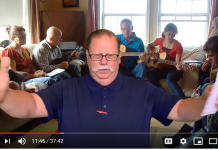When “Connect the dots” means we are going to confront years of ungodly and unscriptural traditions invented by men is when the church goes stage left. Below is a response from Jon Zens to a fellow brother outlining the hindrences why we as the Body of Christ cant connecting the dots. JLB
I’d like to share some of my thoughts that have come to the surface in the past four weeks, flowing out of Dallas Willard’s video on the Local Church, and our Zoom discussions.
It seems to me that there is a real problem with how most believers use the Bible. As a foundation, they assert a desire to “go by the Bible,” God’s Word. However, in practice they end up applying Scripture mainly to their private life, but skip over what it says about life in the body of Christ. If they read it in its body-setting, they would discover that the key pillars of how we do church have no basis in the New Testament.
There are elephants in church sanctuaries that nobody, especially church leaders, wants to deal with or face the implications. If they did, the dominos would start falling and a lot of people would be upset and very uncomfortable. A host of people’s lives are dependent and locked into the continuation and maintenance of traditional church patterns.
I suggest there is zero basis in the NT for us to build the infrastructure of church on the sermon, the pastor and the building.
Dallas Willard cites Leith Anderson approvingly:
In the last chapter of the Renovation of the Heart, I quote a statement from Leith Anderson which I have thought was just wonderful. He says, “while the New Testament speaks often about churches, it is surprisingly silent about many matters that we associate with church structure and life. There is no mention of architecture, of pulpits, length of typical sermons, or sermons. It doesn’t say anything about sermons. It talks about preaching. There are no rules for having a Sunday school, little is said about style of music, order of worship, or times of church gatherings. No bibles, no denominations, no camps, pastors conferences, board meeting minutes. None of that.” (Cited by Willard in the video, “What Is the Local Congregation For?”).
- C. Sproul asserted that Protestants essentially gather “to hear a sermon.” Leith Anderson said that the NT “doesn’t say anything about sermons.” Indeed, the NT is silent about our practice of having one person speak to many Sunday after Sunday. Yet it is safe to say the whole idea of a “worship service” is focused on a person delivering a sermon. The NT, on the other hand, reveals a gathering of saints where all can participate – “each one of you has a song, a teaching . . .” (1 Cor. 14:26). By limiting the proclamation to one mouth, we miss entirely the portion of Christ coming from many mouths. Richard Foster highlighted this problem: “And we do not have to look at religion in America very deeply before we see that it is saturated with the dogma of the mediator. ‘Give us a pastor, give us a priest, give us someone who will do it for us, so that we can avoid intimacy with God ourselves and still reap the benefits’” (Richard J. Foster,Meditative Prayer, IVP, 1983, p. 5).
David Thomas pointed out in 1898 that “official preaching has no authority . . . and it must come to an end sooner or later.” Opening up 1 Corinthians 14, he said:
The Christian church in assembly, on the same occasion, might have several speakers to address them…. If this be so: 1. Should Christian teaching be regarded as a profession? It is so now: persons are brought up in it, trained for it, and live by it, like architects, lawyers, doctors…. 2. Is the Christian church justified in confining its attention to the ministry of one person? In most modern congregations there are some Christian people who by natural ability, by experimental knowledge and inspiration, are far more qualified to instruct and confront the people than their professional and stated minister. Surely official preaching has no authority, either in Scripture, reason, or experience, and it must come to an end sooner or later. Every Christian should be a preacher. Were the half-hour allotted in church services for the sermon to be occupied by three or four Christ-like persons…with the capability of expression withal, it would not only be far more interesting, but more profitably spent than now, (David Thomas, The Pulpit Commentary: 1 Corinthians, F.W. Farrar & David Thomas, Funk & Wagnalls, 1898, pp. 429-433).
Leith Anderson said, the NT “talks about preaching.” However, we must not make the mistake of reading into this concept the notion of a pastor standing behind a pulpit. “Preaching” in the NT referred to people proclaiming Christ to unbelievers outside the gatherings of saints. The noun “preacher” is used three times in the NT, twice of Paul, and once of Noah, “a preacher of righteousness.” Noah did not preach to the choir, but to those who were soon to be drowned (2 Peter 2:5). David Norrington documents decisively that the “sermon” crept into the church via pagan Greco-Roman homilies which were delivered by articulate people who were paid for their speeches (To Preach or Not to Preach: The Church’s Urgent Question?, Quoir, 2013).
Not only is the sermon as we know it unknown in the NT, but the person who gives weekly sermons – “the pastor” – is not to be found in the NT either. Ministry magazine in 2010 asserted confidently, “the local church pastor is key – absolutely central – to everything we are and do as a church.” Let’s suppose a new believer and a seminary scholar were locked in a room with a NT and read it through over and over. What would happen if they were asked when they came out, “Where in the NT did you find evidence for this idea, ‘the local church pastor is key – absolutely central’ to everything a church does?” They would both have to answer with a resounding, “Nowhere.” Yet the assumption that every local church must have “the pastor” is the universal practice of almost all churches. Churches claim that they only go by what the Bible teaches, but the key lynch pin of their practice is found to be without warrant in the NT. But the absence of “the pastor” from NT revelation seems to concern hardly anyone. Do we care that the foundation of our church practice — and the massive infrastructure built upon it – is actually based on human traditions and not God’s revelation? (see my The Pastor Has No Clothes: Moving from Clergy-Centered Church to Christ-Centered Ekklesia)
Think of the many thousands of pages in books since 1600 that have been published delving into the subjects of “the pastor” and the “sermon.” Yet neither of these topics are to be found in the inspired documents that are claimed to be the rule of faith and practice for believers. Furthermore, there are fifty-eight one another’s that are the backbone of the NT which have been ignored and not explored in the history of the church (see my 58 to 0 – How Christ Leads Through the One Another’s). J. I. Packer suggested why this was the case: “discussing gifts was dominated by their interest in the ordained ministry . . . and questions about other gifts to other persons were rarely raised” (“The Puritans & Spiritual Gifts,” Profitable for Doctrine & Reproof, 1967 Westminster Papers, p.15).
Not only was the pastor and the sermon absent in the First Century, but the need for religious buildings had no place either. The early church thrived by the Spirit without erecting buildings to meet in. All religions, including Judaism, had designated structures where adherents assembled. The lack of special buildings made the early believers in each city markedly different than the religious people surrounding them. The days after Pentecost would have provided the perfect components to construct a mega-church structure. There were thousands of believers in Jerusalem who could have come together in a large building. But they stayed away from that option. Instead, they met outdoors around Solomon’s Porch and ate meals together from house to house.
In 1975, Howard Snyder wrote a book, The Problem of Wineskins: Church Structure in a Technological Age. In it, he lamented the inordinate amount of money and resources that go into church buildings – to the neglect of Kingdom priorities, the widows, orphans and the needy. (What would he think of our expenditures these days!) Here are a few of his thoughts on these matters:
What would a denomination do that really wanted to become a church with a New Testament dynamic? Let us suppose . . . First, all church buildings are sold. The money is given (literally) to the poor. (p. 23) Dietrich Bonhoeffer wrote thirty years ago, ‘The Church is the Church only when it exists for others. To make a start, it should give away all its property to those in need.’ (p. 24) With the birth of the church the need for an actual tabernacle or temple passed away . . . . All that was necessary was a place to meet together as the Christian community. The most logical place was the home. (p. 65) Theologically, church buildings are superfluous . . . . It is hard to find biblical support for constructing church buildings . . . . The early church did not build church buildings. (pp. 66-67) If you had asked in the First Century, ‘Where is the church?’ you would have been directed to a group of worshiping people in a house . . . . In other words, the church grew fastest when it did not have the help – or hindrance – of church buildings. (p. 69) Should we simply abandon the use of church buildings? For many churches, this would be the best solution . . . . Remember, during its most vital 150 years, the Christian church never even heard of church buildings. In those days it was mobile, flexible, friendly, humble, inclusive – and growing like mad! . . . Why continue building temples? Why not simply do away with them? The traditions of church buildings are unnecessary in an urban world and are often a hindrance to biblical Christianity. (p. 73)
Karen Mains asked in 1976:
The fact that so many of our church buildings sit empty for major portions of the week perhaps poses questions of stewardship. Can we really justify spending such time and expense in building these structures which are only used a few hours weekly? If they are strictly for show or convenience, is this expenditure really in the interest of our Master? Are there ways we can make our facilities more functional? Are there community services we can perform which will demonstrate Christlikeness to this world? Can we, perchance, do without a building? (Open Heart – Open Home, 1976, pp. 72-73).
I have pointed out three pivotal areas regarding traditional church practice which cannot be discovered in the NT. On what basis, then, are we to believe that they reflect the Lord’s heart? If the Lord has revealed the healthiness of an open gathering where all can express their portion of Christ, are we going to continue the unhealthy practice where one mouth speaks to many ears? Do we not do this to our own peril, plus we miss the blessing of hearing Christ from multiple voices?
Dallas Willard made the point, “I think it’s very important that we do whatever we do from a biblical basis and that anything we cannot bring out of the Scripture as a direction for us to go on a fair and full interpretation, anything like that just don’t do it.” (“What Is the Local Congregation For?”) In light of this, are we just going to let tradition reign with the sermon and the pastor, or are we going to stop doing that which we “cannot bring out of the Scripture”?
Dallas highlighted the dangers of not dealing with distractions and traditions.
We wind up we wind up devoting our efforts to sustaining traditions . . . . That is what I call the vessel trap because we wind up taking care of the vessel . . . . The problem comes when the vessel begins to replace the treasure, and the treasure is left begging or isn’t really considered (“Local Church”).
If the sermon and the pastor are human traditions that create huge distractions, why do we let them go on unchallenged? Is it because they are so embedded in the way things have been done for so long that we can’t handle the thought of the dominos falling, and then being led to new directions by the Spirit?
If we are really concerned about pleasing our Lord, please consider this sobering reality that Jesus taught. Isaiah 55 tells us that, “My word which goes out of My mouth; it will not return to Me empty, without accomplishing what I desire, and without succeeding in the purpose for which I sent it.” True enough. However, Jesus stressed that there was one thing that would derail God’s Word – human traditions.
Rightly did Isaiah prophesy about you hypocrites, as it is written: ‘This people honors Me with their lips, But their heart is far away from Me. And in vain do they worship Me, Teaching as doctrines human commandments.’ Neglecting the commandment of God, you hold to human traditions . . . . You are experts at setting aside the commandment of God in order to keep your tradition. . . . thereby invalidating the word of God by your traditions which you have handed down; and you do many things such as that. (Mark 7)
If the pillars of our church practice are indeed of human origin, then are we not thereby nullifying the Word of God? Why are we wiling to evaluate some things, but refuse to challenge the long-standing traditions that consume our energies and resources? If the key things we assume are right cannot stand if tested by Scripture, then on what basis do we keep doing them? Do we want to be numbered among those who set aside the Word of God in order to continue their traditions?
It seems to me like our Tuesday morning Zoom call manifests important aspects of ekklesia reality. We have an open gathering where all can bring to the table their portion of Christ. We have no one leader. We have shared facilitation. We want to focus on the Lord. Don’t you think local churches would be so blessed if they embodied these dimensions, and moved away from lecture/monologue traditions which has been shown sociologically and educationally to be the least effective method for learning to take place?
Jon Zens, jzens@searchingtogether.org
November 1, 2025










































[…] en Ingles https://godsleader.com/traditions-will-keep-us-from-connecting-the-dots/ […]